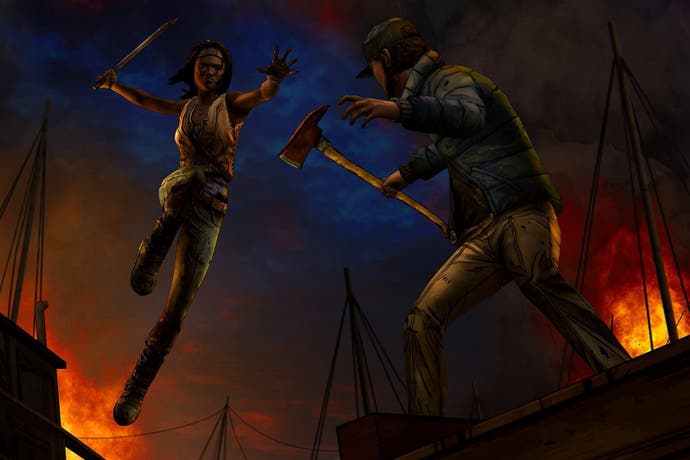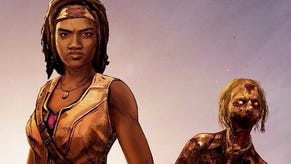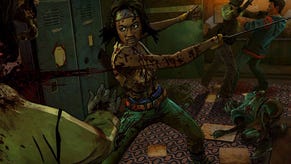The Walking Dead: Michonne review
Michonne impossible.
The Walking Dead: Michonne's leading lady has a lot bearing down on her. She needs to survive a zombie apocalypse, find a reason to go on living after her daughters allegedly died in a walker attack she was absent for, and, most arduously, prove to us that Telltale's spin-off of Robert Kirkman's comic series still has legs.
Telltale's The Walking Dead started off strong, using the tired premise of an unholy undead uprising as a means of exploring parenthood, morality and redemption. Its second season flipped the script allowing us to take the reins of a preteen girl trying to stay strong in the wake of her adult caretakers breaking down. The Walking Dead: Michonne, however, treads overly familiar territory, even if the details are different. We play as a woman this time, and a literal parent at that (whereas Season One's Lee was only a surrogate guardian to Clementine), and although her own feelings of guilt differ from Lee's, it's hard to shake the feeling that we've seen much of this before.
Michonne's main plot, involving an escalating dispute between a tyrannical pair of siblings leading a survivalist group and a neighboring family, likewise covers recognisable ground. There's even a particularly egregious line where a child recalls his father's wisdom about how other people are the real threat in this zombie-laden bayou.
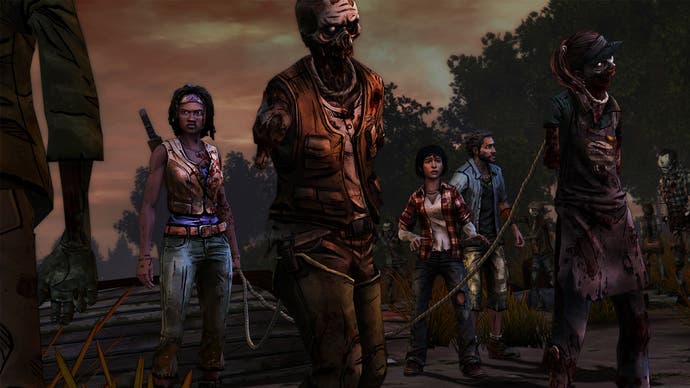
Sometimes it works. Telltale has always excelled at massaging its narratives to provide tricky moral conundrums and Michonne is no exception. A hostage exchange sequence - and the lengthy build up to it - is a particular highlight in terms of mood-setting, writing and pacing. The negotiations happen so quickly that there's no time to get your bearings as you'll almost definitely do something you'll regret. That exhaustive feeling of "Hey, I probably messed up somewhere back there and got someone killed but we're still breathing so let's just be glad about that and move on, okay?" is still in full force.
But move on to what? The stakes are low when the world is in shambles and the series' inability to provide a smidgeon of hope is turning the narrative potential from bleak to broken. Where the first season of The Walking Dead had moments of warmth and levity, Michonne's spin-off offers so little joy that its perpetual glumness has atrophied into boredom.
One problem is that Michonne's most interesting character element - that she's haunted by her missing and probably dead children - is generally explored in an ineffective, cliched manner. We get plenty of surreal flashbacks where her daughters cry "Mommy, where are you?" or "Don't leave us" while eerie gusts of wind overtly telegraph that you're in Hallucination Mode, but such sequences are too on-the-nose to be relatable. We never actually get a sense of what these girls - or their relationship with their mother - was like, leaving them feeling like a symbol of loss rather than an actual tragedy, and it dulls what should be an interesting plight for our leading lady. In short: it's too much telling, not enough showing. Seeing Michonne apply her damaged psyche towards other situations would make her more captivating to watch.
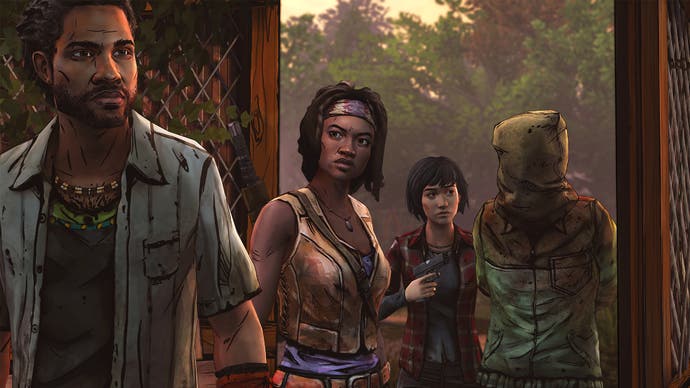
Other attempts at wringing emotions often falls flat as the cast is too undeveloped to elicit much of a response. Most of Michonne's characters fall into broad archetypes with the optimistic leader, sniveling child, stern father, and tough-talking villains rounding out the ensemble. There's some effort to mix and match the moralities of its characters so an opposing clan may contain some rooting interests, but the game's quick pace and small cast shuffles these greyer prospects away as bit parts.
That's too bad as one of Michonne's most interesting aspects is its strong sense of nihilism. Michonne is the most vicious Walking Dead lead yet with a bad case of PTSD and a machete that she wields with disturbing grace. There's an argument that Michonne's slice-first-ask-questions-later approach might be perpetuating the cycle of violence society has devolved into, yet the game seems content to simply write off anyone she stabs as a two-bit henchmen or outright villain. For a game supposedly about consequence, The Walking Dead: Michonne seems to overly glamourise its troubled badass protagonist without really examining her behaviour.
The Walking Dead: Michonne hits the notes that we expect from another Telltale adventure in Robert Kirkman's somber universe, but it brings little that feels fresh. Michonne may be different to Lee or Clementine, but being a quiet badass with "haunted past" and iconic weapon only dulls her appeal in an industry full of these sorts of people. Even when the game soars - and it certainly has its standout sequences - it's hard to shake the feeling that most of what it does Telltale has done better before in previous seasons.
